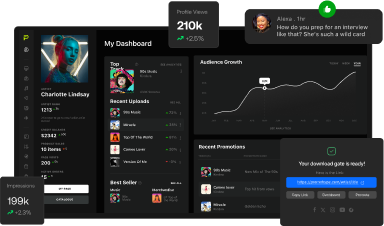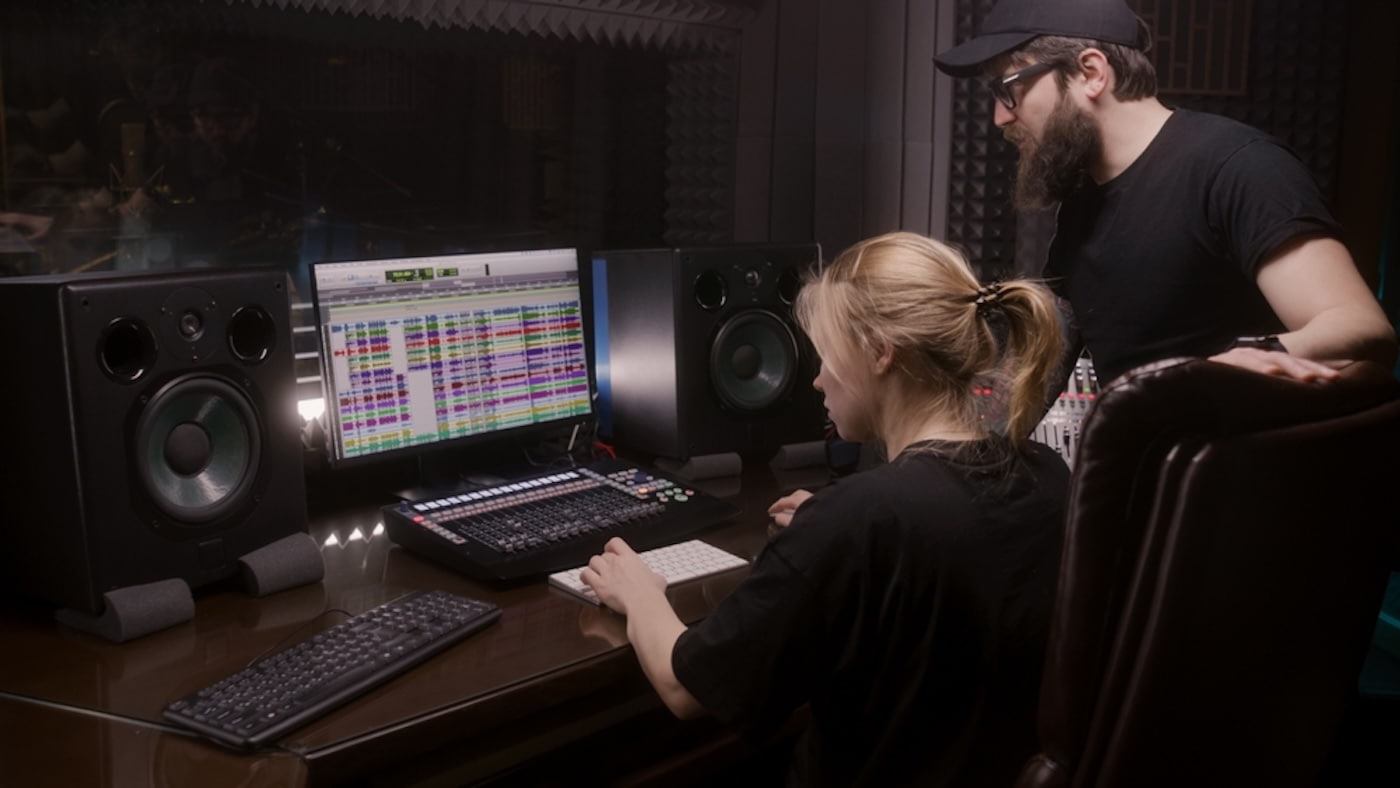
Breaking into the music industry can be a significant challenge for independent artists, but management services can help overcome many of the obstacles.
With years of experience and access to industry contacts, artist managers provide valuable guidance for songwriters and producers.
This guide breaks down the roles and responsibilities of an artist manager, from networking in the industry to marketing and promotion, and elevating emerging acts to stardom.
Get Early Access
To Promo Hype
What Is Artist Management?
The process of artist management is far-reaching, with a primary focus on representing artists within the music industry landscape.
Artist managers help bands, singer-songwriters, and music producers reach a broader audience across multiple platforms.
They also utilize industry connections to facilitate contract negotiations with labels and publishers, thereby expanding the artist’s career.
This allows artists to channel their efforts into writing and recording music without administrative or legal distractions.
Recommended read: The 10 best digital music distribution services.
Why Is Artist Management Important?
Partnering with an artist manager offers numerous advantages, enabling independent artists to focus on their creative journey.
While some independent artists prefer to manage their own careers, many opt to work with an artist manager for various reasons, including:
- Approaching high-level goals: Independent musicians who are eager to break into the mainstream with commercial success often struggle when going it alone. An artist manager has the resources and contacts to bring this high-level goal into the realm of possibility.
- Outsourcing administrative and legal tasks: Creatives of all types often lack the mindset and skills for mundane, day-to-day administrative or legal tasks. Managers have the staff on hand with extensive experience in these fields.
- Assistance with brand building: Setting up an official band website with professional logos and other assets can also be challenging for artists. A management team can assist with this process, handling graphic design and building relationships on social media.
We’ll break down the range of services offered by artist managers and how they can best serve the artist’s interests.
The Role Of An Artist Manager
Hiring an artist manager offers a significant range of benefits for clients seeking to advance their music careers.
Here’s an overview of these roles, from helping artists get signed to record labels to managing publishers and finances.
Music Industry Spokesperson
Perhaps the most prominent role of an artist manager is acting as a representative within the broader music industry.
This includes networking with music journalists to promote music, as well as negotiating contracts with publishing companies.
By engaging with an interconnected network of industry professionals, managers can secure new opportunities for distribution and promotion.
Building The Artist’s Team
In addition to building connections with external industry figures, the music manager also coordinates a close-knit team of roles.
While the scope and complexity of these teams vary depending on the artist’s profile, some core roles are usually included.
Booking agents, public relations experts, lawyers, and music marketing professionals are typically utilized as needed by the artist manager.
Business Manager Duties
One of the primary reasons musicians and producers hire artist managers is to gain access to business-related services.
This encompasses everything from general financial management to royalty tracking, invoicing, and overall budgeting.
Managers are also heavily involved in assisting artists with getting gigs, providing ancillary services that complement this process.
For example, they may help with coordinating travel itineraries, booking hotels and transportation, and other related tasks.
They can also help facilitate additional related processes for artists, such as trademarking a band name in conjunction with an attorney.
Assisting The Artist’s Development
Another vital role performed by artist managers is assisting with their creative development and career planning.
This encompasses various tasks, from creating opportunities for writing songs with other artists to planning new singles or albums.
It also encompasses preparing for tours, hiring videographers and editors for music videos, and other tasks with logistical complexity.
Managers may also assist with digital music promotion strategies, such as accessing Spotify’s Radar Program and other services.
Learn more: How to build a home recording studio.
Artist Management Team Structure
As we’ve touched on briefly, artist management is built around a core team with the manager at the centre controlling the overall initiatives.
Over time, the structure of this team may change, such as through the creation of dedicated tour management or PR teams.
Let’s break down the core team structure in more detail, along with the roles and responsibilities of each member.
1. Artist/Music Manager
The artist manager, sometimes referred to as a music manager, is the central figurehead in the overall management team structure.
They directly interact with the songwriter or music producer to create an overall strategy and long-term vision for their success.
As the head of the team, the manager is responsible for hiring other professionals on a permanent or short-term basis for specific tasks.
They also handle the day-to-day oversight of the team, scheduling meetings, and ensuring members are clearly communicating.
2. Publicist
One of the key players in a management team is the publicist, who is responsible for generating favorable media coverage.
The publicist will liaise with journalists, bloggers, and podcasters, particularly in the lead-up to a new release or live performance.
This also includes traditional print media coverage, as well as assisting with submitting music to radio stations for airplay.
Publicists are involved in all aspects of content creation, collaborating with videographers and photographers to produce promotional materials.
This content is integrated into a comprehensive campaign strategy designed to generate buzz for the artist’s content.
Conversely, publicists are expected to step in for crisis management, protecting the artist’s image or reputation from unfavorable circumstances.
3. Business Manager
While the core manager wears many hats when working with clients, the business manager’s duties are focused on financial issues.
They perform a range of tasks to help singer-songwriters and producers make money with minimal fees and other expenses.
Some of the financial and accounting duties performed by the business manager include:
- Collecting and managing income: This also includes paying any bills the artists owe for additional services and managing the payroll for other members of the artist’s team.
- Oversight of royalties: Income from streaming services and physical media sales is closely monitored to ensure that all payments are made correctly and on time.
- Preparing and filing taxes: Annual tax return filings are prepared to ensure everything is in order and to avoid potential repercussions down the line.
- Financial planning and budgeting: They also assist with general financial planning and managing budgets for services such as recording studios, marketing, and other projects.
- Crafting investment strategies: Once an artist has achieved success and a consistent income stream, they assist and consult on strategies to develop a robust investment portfolio.
The business manager will also file frequent reports to ensure that artists are kept informed about their income and expenses.
4. Lawyer
Artist teams often include a dedicated lawyer in the structure, typically one with specialized experience in entertainment or music law.
The lawyer will work closely with the overall manager when negotiating contracts with labels or publishing companies.
Depending on the stage of negotiations, they may be required to provide additional legal counsel or collaborate with additional attorneys.
Contracts with record labels and publishers are often complex, so the lawyer’s responsibilities ensure everything is above board.
They’re also expected to work with booking agents and promoters when defining the terms of tours and other performances.
Likewise, they assist with negotiating deals with brand partners and setting up endorsement and sponsorship deals for artists.
Get Early Access
To Promo Hype
Key Partners With Artist Management Teams
Artist managers not only liaise closely with other members of their team; they’re also responsible for engaging with external parties.
With experience working across popular music genres and niche subgenres, managers can assist clients with a variety of relationships.
Here are some of the core external partners with whom managers primarily interact during their work with artists:
Record Labels
One of the primary roles of managers in the context of labels is serving as the artist’s primary advocate and cheerleader.
This includes negotiating terms of recording contracts and helping to secure the most favorable deal possible for the artist.
Acquiring backing from a label can significantly improve the artist’s prospects and cover a range of expenses and services.
The manager assists in negotiating such deals in conjunction with the lawyer, providing legal counsel and helping to negotiate contract terms.
They are also involved in protecting the artist or band’s creative control, including clauses that protect ownership and rights.
Additionally, managers will assist labels with marketing and promotion initiatives, coordinating social media campaigns and media appearances.
Artist managers draw on extensive knowledge of the industry, with a deep familiarity with record labels looking for artists they represent.
They are also known to collaborate with A&R teams, selecting the best songs for release and pairing them with suitable producers.
Music Publishers
Music managers have a similarly complex relationship with music publishing companies, which extends beyond negotiations to other activities.
This begins with assisting artists with contracts and ensuring they get the best possible terms without compromising creative interests.
Managers will also negotiate for optimal compensation, coordinating song placements that maximize potential music royalties.
As with securing deals from labels, managers will draw on legal expertise when negotiating deals with music publishers to protect their clients.
Once the deal has been finalized, their roles shift toward strategic planning and coordination of upcoming releases and performances.
This involves a multi-faceted approach that strives for optimal reach online and offline, helping artists go viral on TikTok and other platforms.
Some additional qualities that managers bring to bear when interacting with music publishers on behalf of artists include:
- Centralizing communication: Thanks to their track record of engaging with publishers, managers are well-positioned to streamline communication between relevant parties. This ensures negotiations don’t get bogged down in red tape and can be concluded satisfactorily with minimal friction.
- Alignment of artists and publishers on overarching strategies: Songwriters and producers often have a clear vision for the direction they want their careers to take. By coordinating with managers, this vision can be oriented into a coherent strategy with the publishers.
By acting as the go-between, the manager can serve the best interests of the artist, protecting their interests in both the short and long term.
Booking Agents & Promoters
While negotiating deals with labels and publishers is critical for success, artists must also focus their efforts on live performances and tours.
Revenue from streaming services and digital sales can be underwhelming, and live shows offer much-needed additional income.
The manager’s role in relation to such events is through securing performances by liaising with booking agents and promoters.
For booking agencies, this means delegating the task of finding suitable venues and arranging specific performance dates and ticket prices.
It also incorporates elements of strategic planning, such as timing the upcoming events around a new single or album release.
To achieve this, managers can leverage a vast network of contacts to create opportunities for sell-out tours and one-off shows.
They also play a key role in coordinating with promoters, handling the financing of marketing initiatives, while representing the artist’s interests.
After the event, the manager will ensure revenues from ticket and merchandise sales are correctly collected and distributed.
Read this next: Music production 101: The ultimate beginner’s guide.
Artist Management Contracts & Compensation
Representation from a management company comes at a price, with various commission rates and other compensation structures.
Let’s explore some general splits based on contracts, along with average commission rates and other terms to be aware of:
Contracts & Splits
Artist management contracts are clearly defined legal agreements that outline the roles and responsibilities of managers for clients.
As such, the terms vary between artists, with variables including term length, termination rights, and additional clauses.
The degree of power held by the manager is also considered, as well as the decisions that require the artist’s approval.
While it may seem as if independent artists will be unable to afford management fees, there are viable arrangements to consider.
The most common arrangement is through commission-based payments, in which managers receive a percentage of the income.
Various factors influence the artist-manager split, based on sources of revenue such as music royalties from physical and digital sales.
Average Commissions
Speaking in general terms, the average commissions for managers typically range between 15% and 20% of the artist’s gross income.
This covers income from all sources, including streaming services, digital and physical media sales, and money generated from live events.
With that said, recent shifts in the industry have seen the manager’s role becoming more demanding, with commissions altering accordingly.
It’s not uncommon for more experienced managers to charge a commission rate of 25% or higher, depending on specific conditions.
Commission rates are, however, subject to negotiation, something which many independent artists fail to take advantage of.
This can be influenced by the artist’s level of success, particularly when renegotiating terms and conditions of management representation.
Additional factors that can impact commission rates include exclusivity of income streams and the duration of the management contract.
When seeking to finalize a commission clause, consider the following factors:
- Clarification of the contract’s scope: Seeking a clear and precise definition that outlines the scope of the contract ensures income sources are properly defined beforehand.
- Clear definition of what is classified as expenses: Managers can classify a variety of costs that relate to their commission rates, so clarifying these in advance is essential.
- Audit rights for the artist: If you’re partnering with a manager, it’s essential to clarify your rights to audit their accounts and verify that the correct commission amount has been calculated.
By implementing these measures, artists can ensure they negotiate the best possible terms when partnering with a manager.
Sunset Clause
A sunset clause is a contractual provision that allows managers to receive commissions after agreements are concluded.
It’s not uncommon for artists to be sued over unpaid commissions, so understanding how sunset clauses operate is essential.
The function of such a clause is to ensure that managers are fairly compensated for their work past the end of a contract.
By providing clarification on post-contract terms, the sunset clause alleviates the possibility of ongoing disputes between managers and artists.
Sunset clauses are often set at a reduced commission rate, with the rate decreasing gradually over time, depending on the arrangement.
Learn more: Mechanical royalties vs. performance royalties.
Top 5 Best Artist Management Companies
If you’re considering reaching out to music management companies to help with your career, there are plenty of options to consider.
Here are some of the best artist management companies currently available for artists to foster their career development:
- Red Light Management: The world’s largest independent management company, Red Light Management, encompasses a diverse range of artists and genres.
- Roc Nation: Founded in 2008 by rapper Jay-Z, Roc Nation’s multi-faceted approach to artist development includes support for tours, music publishing, and strategic brand development.
- Maverick: Formed in 2014, the Maverick management company includes high-profile acts ranging from Ricky Martin to Aerosmith on its roster of clients.
- Full Stop: Another prominent management company is Full Stop, which has many notable clients, including Maroon 5, Harry Styles, US, and Cardi B.
- Q Prime: The American music management company Q Prime specializes in rock bands, with notable acts such as Metallica, Def Leppard, Cage the Elephant, and the Red Hot Chili Peppers on its client list.
While getting on the books of these management services can be challenging, there are many smaller alternatives worth considering.
How To Find An Artist Manager In 2025
Whether you’re a singer-songwriter or an electronic music producer, seeking representation can significantly enhance your career prospects.
If you’re looking to partner with an artist manager, here are some steps you can take to streamline the process:
- Research managers who fit your musical style: Each manager has his or her own particular focus, whether this relates to the level of experience for artists or musical genres and styles. Researching managers who specialize in your specific niche will increase your chances of securing much-needed representation.
- Check out industry events and directories: There are many music industry events that artists can attend to build up a network of professional contacts, including managers. You can also access comprehensive resources and directories for electronic music artistsor singer-songwriters working in other genres.
- Seek recommendations in your musical circles: If you’ve established a network of like-minded artists, composers, and producers in your area, these people can provide unique insights into finding a manager. Seek out recommendations for artist representation from your peers and ask for detailed insights into what to expect from contracts.
- Connect with management companies on social media: Social media is ubiquitous for music industry professionals and independent artists alike when it comes to forging new connections. You can use X, Instagram, Facebook, and TikTok to connect directly to managers who may be able to assist with your professional journey.
- Use the Music Managers Forum: One of the most popular platforms for artists when seeking management deals is the Music Managers Forum, which offers a wealth of helpful information. Artists can submit their information in a few simple steps, as well as send personalized emails to managers along with music samples.
Before reaching out to management services or individuals, clarify your vision and goals so you’re absolutely clear on your expectations.
You should also dedicate time to refining any music samples you have, utilizing mixing and mastering services to achieve optimized quality.
Summary
Signing a deal with an artist manager can be a game-changer for songwriters and producers seeking to develop their careers.
Their strategic advice, combined with access to resources and contacts, can make them invaluable assets for achieving high-level goals.
It’s an essential partnership with long-lasting, positive benefits that can transform emerging acts into key players in their genre.
Get Early Access
To Promo Hype
Join Promo Hype






